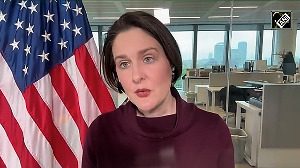Union Finance Minister Nirmala Sitharaman, along with her team of bureaucrats, delved into the fine print of the 2024-25 Budget documents in a press conference, detailing the government’s road map on bringing down the debt-to-GDP ratio and bold tax measures.
Ruchika Chitravanshi, Shrimi Choudhary, and Harsh Kumar report.

On revenue mobilisation due to capital gains
Sitharaman: Revenue mobilisation is not just tax-based.
Mobilisations from non-tax revenue are also coming up, including dividends from PSUs, optimum utilisation of asset monetisation, and generating resources from newer areas.
In all, revenue is going to be mobilised better, and as a result of this, the revenue forgone will be now made up for.
Revenue Secretary Sanjay Malhotra: Revenue of about Rs 37,000 crore will be forgone, while Rs 29,000 crore will be mobilised through direct taxes… Rs 29,000 crore primarily comprises three taxes, which are the increase in the securities transaction tax (STT), only on derivatives, share buyback (taxed) in the hand of recipient, and capital gains; Rs 15,000 crore will come from capital gains.
On the indirect tax front, there will be a revenue forgone of about Rs 8,000 crore, due to a reduction in Customs duty on commodities, particularly gold.
Then there will be revenue forgone because of tweaking of tax rates of personal income tax and increased standard deduction.
On bringing down debt-to-GDP ratio
Finance Secretary T V Somanathan: It is not the intention to focus on a deficit number, but rather to look at what will keep reducing our debt-to-GDP ratio in normal years.
The reason for this is a fixed figure, which historically has been enshrined in the FRBM Act (Fiscal Responsibility and Budget Management Act) (but) does not take into account the specific dynamics of a fast-growing economy like India.
The deficit that we can support in a particular year without expanding our debt is not necessarily 3 per cent.
It is probably less than 4.5 per cent.
It is a new approach that the government has spoken about.
Each year’s calibration will be based on what will be a percentage that will keep our debt on a reducing path.
On reduced estimates of small savings
Somanathan: Between the Revised Estimate and the Actuals for FY24, there was a slight decline.
Taking that decline into account, we just projected that what we expected would not be realised during the current year.
Why has this happened? It is a mix of various other factors like the attractiveness of other investments, such as the stock market and bank deposit rates going up.
For a reduction in the fiscal deficit, we have chosen to reduce primarily in the Treasury bill segment, rather than in the dated securities.
On 10.5 per cent nominal growth in GDP
Somanathan: The 10.5 per cent growth pro jection is a combination of 7 per cent growth and 3.5 per cent GDP deflator.
Yes, it is slightly conservative but not way off.
We would prefer to achieve the numbers.
On FDI from China
Sitharaman: The Economic Survey gave its view on the investments from China.
As things stand today, investments do go through the Press Note 3 process when it comes from China or any of our neighbouring countries.
The Economic Survey has indicated that it might be time for us to open up.
It’s (the Survey) normally at arm’s length.
But that doesn't mean that I’m disowning the suggestion.
On equalisation levy
Sitharaman: The Pillar One and Pillar Two (global tax deal) negotiations have been going on since 2022.
One of the things becoming more than obvious was that we wanted a fair solution.
But the point of contention from them (other nations) has always been: Should we collect an equalisation levy?
In the interest of moving towards Pillar One and Two, it was necessary for us to take steps.
On special assistance to Bihar and Andhra Pradesh
Sitharaman: I’ve already mentioned in the Budget speech that Rs 15,000 crore is coming through multilateral development assistance, which we borrow from multilateral banks.
And further assistance will also be extended.
There is no definitive amount.
On reviewing the Income-Tax Act
Sitharaman: Gradually, we are moving towards a simplified taxation regime, while bringing down the incidence of tax itself.
Therefore, we are taking this review.
On relief to micro, small and medium enterprises (MSMEs)
Sitharaman: MSMEs have requested support from us for several years.
When they reach the SMA 1 stage, they become very tense because banks stop their financing.
They are already under stress, and by the 90th day, they often become non-performing assets (NPAs).
To provide them with a workable solution, we discussed this with the RBI, which has a respectable framework where banks are given some margin to handle MSMEs at the SMA 1 stage, without pushing them to the SMA 2 stage.
On divestment
Department of Investment and Public Asset Management Secretary Tuhin Kanta Pandey: Our holistic disinvestment strategy is focused on value creation.
We also carry out calibrated divestment.
But our main focus is value creation.
The primary aspects we consider are the fundamental performance of Central Public Sector Enterprises (CPSEs), their capital expenditure, and consistent dividend policy.
This year, we have also made a provision of Rs 50,000 crore.












 © 2025
© 2025